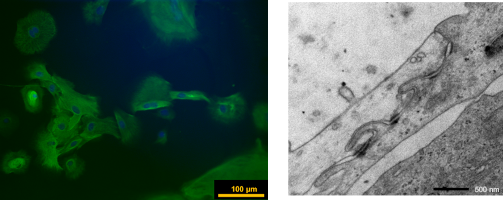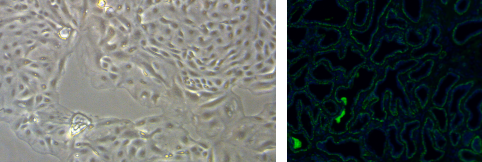Establishment of In-Vitro-Models
Angiogenic Potency of Microvascular Endothelial Cells
Project Team: Dr. Christina Herre, Dr. Giuliano Corte, Prof. Robert Klopfleisch, Prof. Mahtab Bahramsoltani
Angiogenesis, the development of new blood vessels from existing ones, plays a pivotal role in various pathological processes. Both the inhibition of angiogenesis for the treatment of tumor diseases and its stimulation in ischemia are the focus of current research. Due to better standardization and not least to reduce the number of animal experiments, these studies are often carried out on microvascular endothelial cells cultivated in vitro. However, these endothelial cells represent a heterogeneous population in each tissue with regard to their angiogenic potency, which often impairs the reproducibility of the in vitro systems of angiogenesis. Therefore, our project is dedicated to the identification and characterization of factors that are differentially expressed in vitro in endothelial cells with different angiogenic potency.

Characterization of the Ruminal Epithelium in Three-Dimensional Cell Culture
Project Team: Franziska Liebe, PhD, Saeed Khomeijani Farahani, Katja Reiter, Prof. Johanna Plendl, Prof. Dorothee Günzel, Prof. Friederike Stumpff
In order to reduce animal testing and conserve resources, the focus is increasingly shifting to research in cell cultures. The epithelium of the rumen of ruminants is a multi-layered keratinizing squamous epithelium, which not only has a protective function but also crucial transport properties. Therefore, knowledge of the digestion and resorption processes in the rumen is very important for the improvement of feeding methods for ruminants. This project is dedicated to the establishment and characterization of a ruminal three-dimensional cell culture model in addition to the generation of ruminal organoids, which can then be used to study transport mechanisms and barrier properties.

In-Vitro Cultured Lactocytes as a Potential Source of Milk
Project Team: Kai Rickmann, Prof. Mahtab Bahramsoltani, Jonathan Vidak, Dr. Viviane Filor, Annekatrin Bonack, Dr. Salah Al Masri
Due to its high nutrient content and processing options, milk is a frequently consumed foodstuff. Alternative options for milk production are both economically significant and of great social interest in terms of climate and animal protection. As part of this project, an in vitro model based on bovine lactocytes will be established to investigate the potential of these lactocytes as a source of milk.
